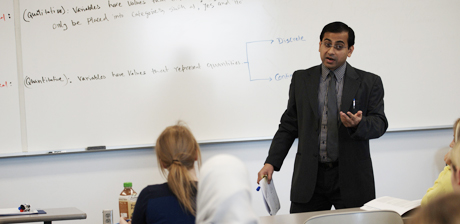October 21, 2014
Are you spending time or money?
Kaustav Misra knows that economics isn’t called the dismal science for its thrilling course content.
“The moment you start with big words, phenomena, concepts — students will leave the class,” the assistant professor in economics said. “Physically, they’ll be there, but mentally, they’ll have left.”
“Your most important job is to keep them alive in the classroom,” he added. That’s why Misra brings laughter to his lectures. “You have to teach it in a way that students feel connected,” he said.
“Then you start bringing the concepts to the table.”
It’s calculated, Misra said. “We joke around, but at the same time, I convey my message through the jokes. No matter what I’m teaching them, I want to make sure they’re getting it.”
 And from his experiences, it seems to be working. “They are alive in that classroom,” Misra said. “They talk. They laugh. They argue, and they work with me.”
And from his experiences, it seems to be working. “They are alive in that classroom,” Misra said. “They talk. They laugh. They argue, and they work with me.”
When you meet him, it’s clear the Calcutta, India, native and Mississippi State University Ph.D. is straightforward. For instance, he knows he has an accent. That’s why he acknowledges it with students on their first day of class.
“I tell them, ‘The accent, you’ve got to deal with,’” he said. “‘But if you think you can deal with it and get along with me, I’m sure the day you step out of this class, you will have learned something from me.’ And students have liked hearing that.”
Overall, though, that’s what Misra wants for them: to think of themselves as investors. “I preach it to students every time I see them: Whatever you’re spending, time or money, find out what you’re getting out of it. Otherwise, you are spending your time and money, and it’s all going to go to the water.”
In fact, from Misra’s teaching, students take theory outside the classroom. During his first semester at SVSU in winter 2011, Misra was teaching his international economics class about how buying and selling currencies can be incredibly lucrative. So students began doing it themselves, and asked Misra for his input.
Today, students still buy and sell currency even as they take classes. Since then, others have stepped forward, asking Misra for investment advice. (He reminds them that this isn’t his expertise and that the risk is entirely theirs, but he’s happy to offer help with the theory.)
But no matter which way you look at it, economics isn’t an exact science. “It’s between a science and an art,” Misra said. “You need an imagination to understand and see it. That’s why the subject is tricky.”
In the end, the study is all an investment, Misra said, and if you stick around, the return is high.
“You open your tired eye and understand the world in a new way.”
